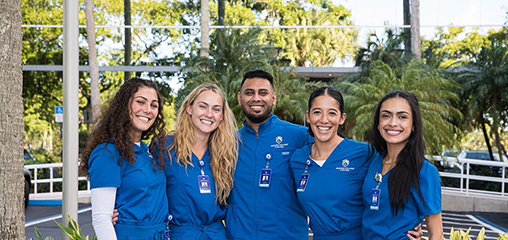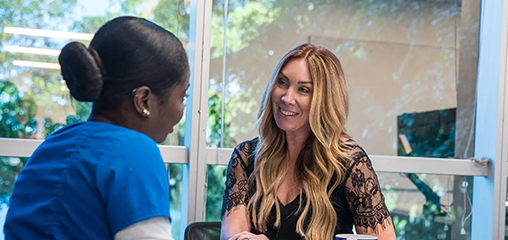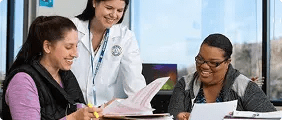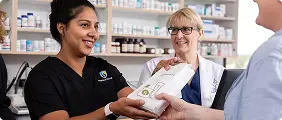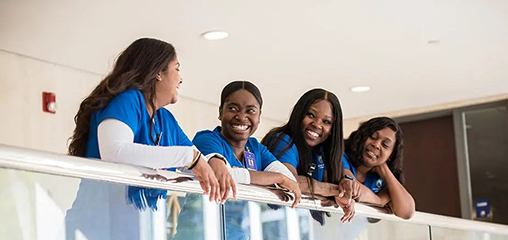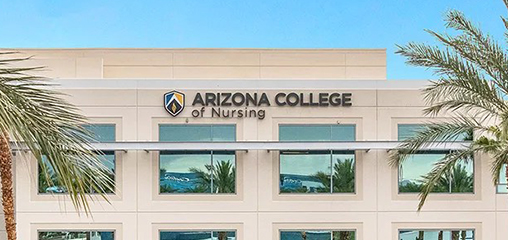Medical Assistant Program Course Descriptions
Classes begin March 23rd

Medical Assistant With Phlebotomy – Schedule Of Courses
Medical Assistants assist physicians with the examination and treatment of patients in addition to performing various administrative duties. Their responsibilities may include: checking vital signs, obtaining medical histories, preparing patients for examination, performing basic laboratory tests, giving injections, applying bandages, taking electrocardiograms, cleaning and sterilizing instruments and providing patient education under the supervision of the physician.
Clinical Laboratory Sciences Course Descriptions
The objective of the Arizona College’s Medical Assistant with Phlebotomy program is to provide a sound educational environment for instruction and training to equip its graduates for entry-level positions as medical assistants.
Clinical Laboratory Sciences: CLS 103
Emergency & Primary Care
2.0 Credits
Learn More
Principles of effective communication skills used in patient education and health history documentation are discussed. The students learn to assist with various types of routine medical examinations and to record the patient’s physical measurements and vital signs. Prerequisite: None
Clinical Laboratory Sciences: CLS 107
Patient Diagnostics
2.0 Credits
Learn More
Provides the theory of electrocardiography, including the QRS complex, P&T waves and the electrical impulse system. Basic procedures include 12-lead ECG placement and machine operation. Holter monitoring and mounting of ECG’s recognition of artifacts and cardiac emergencies will be addressed. Introduction to pulmonary function tests and spirometry practice is also included. Prerequisite: None
Clinical Laboratory Sciences: CLS 111
Therapeutic Procedures
2.5 Credits
Learn More
The course covers a basic knowledge of pharmacology, the study of drugs and their usage. Students will focus on dose calculations, drug abbreviations, drug actions and usage of the drug reference manuals. Students will also learn practical applications of various injection techniques and medication administration and documentation. Prerequisite: None
Clinical Laboratory Sciences: CLS 113
Medical Asepsis & Minor Surgery
2.0 Credits
Learn More
This course focuses on medical and surgical asepsis used in ambulatory care settings. OSHA standards required in the performance of infection control and personal safety are also discussed. Students will identify surgical instruments and sterile techniques required while assisting in minor office surgery. An overview of dermatology and wound care will be discussed. Microbiological testing including culture and sensitivity will be presented. Prerequisite: None
Clinical Laboratory Sciences: CLS 115
Phlebotomy Basics
2.0 Credits
Learn More
This course discusses the concepts related to the practice of phlebotomy. Students will learn medical terminology, including prefixes, suffixes, word roots, abbreviations and symbols. Basic diagnostic and laboratory tests associated with phlebotomy venipuncture procedures, which includes the discussion of the process and steps, equipment, venipuncture sites, collection tubes and routine blood test and cultures will be taught. Students will learn the anatomy and physiology of the circulatory system and become familiar with the disorders and diagnostic tests of the circulatory system. Prerequisite: None
Clinical Laboratory Sciences: CLS 117
Phlebotomy Procedures
2.0 Credits
Learn More
This course discusses the practice of phlebotomy and venipuncture pre-examination variables. Students will also learn the organizations and agencies that support quality assurance in a health care setting. Concepts and skills related to venipuncture procedures are taught, including a review of human anatomy and physiology. This course will also cover special procedures involving non-blood specimens and tests. Prerequisite: None
Clinical Laboratory Sciences: CLS 119
Phlebotomy Special Procedures
2.0 Credits
Learn More
This course discusses the concepts related to the practice of phlebotomy. Students will learn medical terminology, including key terms and abbreviations. They will also learn concepts and skills related to special collection procedures which include pediatric and elderly collection procedures, as well as arterial and intravenous collections. Point-of-care testing principle applications will also be taught. Prerequisite: None
Medical Administrative Procedures & Computer Course Descriptions
To meet the training objectives of the Medical Assistant with Phlebotomy program, the following equipment is utilized: IBM compatible computers and printers, calculators, electrocardiograph machine, autoclave, simulated arm for venipuncture, microscopes, examination tables, centrifuge, platform scale, sphygmomanometers, stethoscopes, thermometers, incubator, hemocytometers, medical instruments, anatomical charts, human skeleton organ models and various other teaching aids.
Medical Administrative Procedures: MAP 114
Medical Insurance
2.5 Credits
Learn More
This is a practical application course in which various insurance plans such as group insurance, third-party policies, Medicare and Workers Compensation are explored. Students will be involved in the completion of various patient information and claim form requirements. They will be familiarized with insurance terminology and the preparation beforehand of computer generated forms. Prerequisite: None
Computer Courses: COM 108
Microcomputer Concepts & Keyboarding
2.5 Credits
Learn More
This course provides a microcomputer orientation with an overview of computer information systems. It introduces computer hardware, software and information systems. Students will learn Windows as well as Microsoft Office, Word and Excel. Finally, this course also helps students build basic typing skills as well as develop speed and accuracy while typing. Prerequisite: None
Computer Courses: MAP 118
Electronic Medical Records
2.5 Credits
Learn More
This course will introduce students to electronic medical records utilizing the software program. Students will complete patient case studies which cover administrative and clinical tasks. The case studies require students to enter various types of data, including patient demographics, medical history, clinical findings and insurance billing information. Prerequisite: None
Health Care Fundamental & Professional Studies and Externship Course Descriptions
The Medical Assistant with Phlebotomy program consists of three (3) terms of ten (10) weeks each. Each term is divided into two (2) sessions. Each session consists of five (5) weeks. The final session is 6 weeks. The entire program is approximately 31 weeks.
Health Care Fundamentals & Professional Studies: ADM 101
Career Development
2.5 Credits
Learn More
This course guides students through the employment process by learning to complete applications, prepare cover letters and write effective resumes and follow-up letters. Other topics include interview skills, networking, continuing education, resigning a position, career advancement and a general orientation to the ever-changing dynamics of the health care delivery system. Prerequisite: None
Health Care Fundamentals & Professional Studies: ADM 107
Medical Administrative Practices
2.5 Credits
Learn More
This course will introduce students to the fundamentals of administrative medical assisting including professional telephone techniques, patient appointment scheduling, written communication, electronic applications and quality customer service. Students will explore an overview of medical law and ethics of the health care profession. Prerequisite: None
Health Care Fundamentals & Professional Studies: BIO 126
The Body as a Whole
3.0 Credits
Learn More
Coordination and regulation of the body systems are discussed in this course. Students learn how the nervous system and the endocrine system work together to control the functions of the body. Cellular reproduction, body systems and directional terms are addressed. Prerequisite: None
Health Care Fundamentals & Professional Studies: BIO 127
The Body’s Circulation & Defense
3.0 Credits
Learn More
In this course, students will examine the structure, function and conduction of the heart and the pathway of circulation. Students will also explore the physiology of respiration, which includes the structures and disorders of the respiratory system and treatment options. Included in the course are blood composition, typing and disorders. The course also examines the lymphatic system to include the organs and their functions and discusses immunity. Prerequisite: None
Health Care Fundamentals & Professional Studies: MTP 118
Medical Terminology
3.0 Credits
Learn More
This course focuses on construction, pronunciation and application of medical words including prefixes, suffixes and word roots. A basic level of organization within the human body is presented. An overview of the major body systems is provided and terms related to the systems are learned. Abbreviations and pharmacology concepts and introductory legalities related to documentation in the health care industry are included. Prerequisite: None
Externship: EXT 210
Externship
7.0 Credits
Learn More
A 210-hour, full-time externship in an approved facility under the supervision of a qualified professional. Prerequisite: Successful completion of all classroom courses in the program.
Request Information To Speak With An Advisor Today
Guide to Becoming a Medical Assistant with Phlebotomy Skills
Ready to make a difference in healthcare? Explore the path to becoming a medical assistant with phlebotomy skills today.
